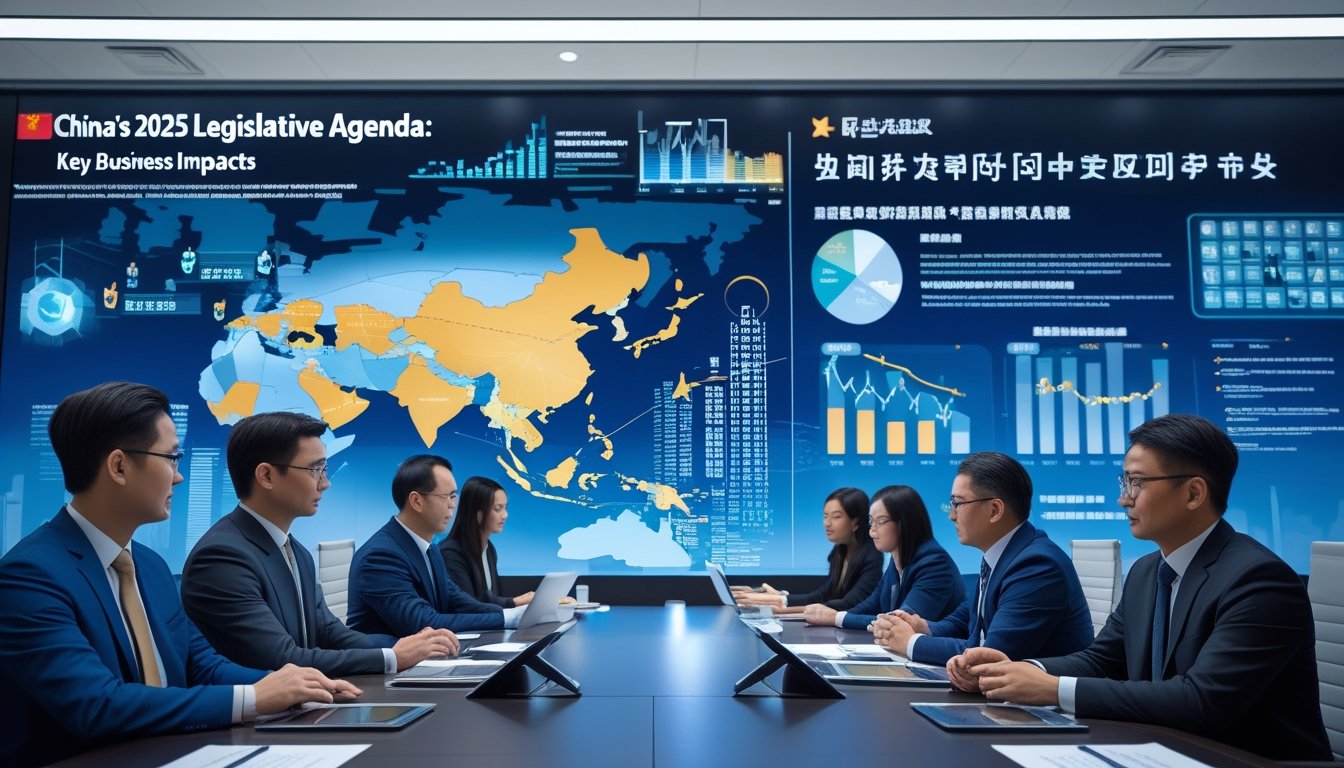China plays a big role in the world today, and its rules on dealing with other countries are important for everyone involved in international business or politics to understand. These laws determine how China trades, makes agreements, and communicates with nations around the globe. In this blog, we're peeling back the layers to show you the most crucial parts of China's foreign relations law, in a way that's easy to grasp and apply to your own dealings with China.
Understanding the ins and outs of China's foreign relations can be tricky. That's why we're here to break it down for you. We'll explain the basics and highlight the latest updates, so you can see how these laws might affect your work or study related to China. Get ready to gain insights that will help you work smarter and stay informed about China's place on the world stage.
Historical Context and Legal Framework
China's foreign relations law has undergone significant changes over the years, reflecting the country's evolving role on the global stage. Understanding the historical context and legal framework is crucial to gaining a comprehensive understanding of China's foreign relations law.
Evolution of China's Foreign Relations Law
The evolution of China's foreign relations law can be traced back to the early days of the People's Republic of China. The Constitution of the People's Republic of China, adopted in 1954, laid the foundation for the country's foreign policy. It stated that China would "adhere to the principles of peaceful coexistence and conduct foreign relations on the basis of equality and mutual benefit."
Over the years, China has enacted a series of laws and regulations to govern its foreign relations. The Law on Foreign Relations, passed in 2023, provides a comprehensive framework for China's foreign relations. It aims to "safeguard China's national sovereignty, national security, and development interests and uphold international fairness and justice."
Key Institutions and Legal Instruments
The National People's Congress (NPC) is the highest organ of state power in China. It is responsible for enacting laws, including those related to foreign relations. The Standing Committee of the NPC is the body responsible for interpreting and implementing these laws.
Several legal instruments govern China's foreign relations. These include bilateral and multilateral agreements, international treaties, and customary international law. China's approach to international law has been shaped by its unique historical and cultural background, as well as its evolving role in the international community.
China's Foreign Policy Objectives
The law aims to safeguard China's national sovereignty, national security, and development interests while upholding international fairness and justice.
Safeguarding National Sovereignty
China's foreign policy objectives include safeguarding national sovereignty. The law enshrines China's right to take countermeasures against actions deemed a threat to its sovereignty. China also seeks to maintain stability and security in its neighboring regions, including the South China Sea and Taiwan.
Economic Development and Foreign Investment
China's foreign policy objectives also include economic development and foreign investment. The Belt and Road Initiative (BRI) is a key component of China's foreign policy, aiming to enhance economic cooperation and connectivity with countries along the ancient Silk Road. China also seeks to expand its foreign investment, particularly in developing countries, to support economic growth and development.
Global Development and Cooperation Initiatives
China's foreign policy objectives also include global development and cooperation initiatives. The Global Development Initiative (GDI) is a key component of China's foreign policy, aiming to support sustainable development and poverty reduction in developing countries. China also seeks to strengthen cooperation with international organizations, such as the United Nations, to address global challenges, including climate change and global health issues.
Mechanisms of Diplomacy and Security
International Treaties and Agreements
China's Foreign Relations Law emphasizes the importance of international treaties and agreements in promoting cooperation and maintaining international peace and security. The country has signed numerous treaties and agreements with other nations on issues such as trade, investment, and environmental protection. These agreements provide a framework for diplomatic and economic relations between China and other countries.
Military and Defense Posture
China's military and defense posture is an important aspect of its foreign relations strategy. The country has the largest standing army in the world, and its military modernization program has been a focus of attention in recent years. Some countries see China's military capabilities as a potential threat, while others view them as a necessary deterrent to maintain regional stability.
Countermeasures and Sanctions
China has the ability to impose countermeasures and sanctions on other countries in response to perceived threats or violations of its sovereignty. These measures can include economic sanctions, travel restrictions, and other forms of retaliation. The Foreign Relations Law provides a legal framework for such actions, emphasizing the need to protect China's national security and development interests.
China's President Xi Jinping has emphasized the importance of diplomacy and peaceful coexistence in the country's foreign relations strategy. The country seeks to promote cooperation and mutual benefit with other nations, while also safeguarding its own interests and sovereignty. The mechanisms of diplomacy and security outlined in the Foreign Relations Law provide a framework for achieving these goals.
Economic Relations and Trade Policies
Foreign Trade and Investment
China's foreign trade and investment policies play a crucial role in its foreign relations. The country has been a member of the World Trade Organization (WTO) since 2001, which has helped to increase its integration into the global economy. The Ministry of Foreign Affairs is responsible for formulating and implementing China's foreign trade policies.
China's foreign investment policies have also evolved over time. The country has become an important destination for foreign investment, and the government has implemented various measures to attract foreign investment. The Anti-Foreign Sanctions Law, which was passed in 2021, aims to protect China's interests and promote fair competition in the global market.
Restrictive Measures and Legal Responses
In recent years, the United States has imposed various trade restrictions on China, which have had a significant impact on China's economy. In response, China has implemented its own measures, including tariffs on US imports and the creation of the Unreliable Entity List, which targets foreign companies that pose a threat to China's national security.
China has also taken legal action against countries that it believes have violated its trade policies. For example, in 2019, China filed a complaint with the WTO over US tariffs on Chinese goods. The Ministry of Foreign Affairs is responsible for handling such legal matters.
International Exchanges and Cooperation
Despite the challenges posed by trade restrictions and disputes, China remains committed to international exchanges and cooperation. The country has established various platforms for international cooperation, including the Belt and Road Initiative, which aims to promote infrastructure development and economic cooperation between China and other countries.
China has also signed various trade agreements with other countries, including the Regional Comprehensive Economic Partnership (RCEP), which is the world's largest free trade agreement. The Ministry of Foreign Affairs is responsible for promoting such international exchanges and cooperation.
Challenges and Future Directions
Territorial Integrity and Global Tension
China's Foreign Relations Law is aimed at strengthening the country's territorial integrity and protecting its sovereignty. However, this has led to tensions with neighboring countries, especially in the South China Sea and East China Sea. The law asserts China's claims over disputed territories, which has been met with resistance from other countries. This has led to an increase in military posturing and a potential for conflict.
Human Rights and International Criticism
One of the major challenges facing China's Foreign Relations Law is the issue of human rights. China has been criticized by the international community for its treatment of ethnic minorities in Xinjiang and Tibet, as well as its suppression of political dissent. The law does not address these concerns, which has led to increased scrutiny and criticism from the international community.
Prospects for Peaceful Coexistence
Despite the challenges, there are prospects for peaceful coexistence between China and other countries. The law emphasizes the importance of peaceful development and cooperation with other countries. China has also been actively engaging in diplomacy and building relationships with other countries. However, this will require a willingness to compromise and address the concerns of other countries.
Conclusion
As you can see, China's foreign relations law is not just a set of rules; it's a guide for interacting with a major world power. By getting familiar with the basics, you'll be better placed to navigate the international scene with China, whether you're making deals, studying policy, or just trying to keep up with global news. With the insights from this blog, you're now better equipped to engage with China in a way that's informed and strategic.
If you're ready to take the next step and dive deeper, especially into trade agreements and contracts, there's more to learn. Check out our expert article on Trade-Related Contracts and Agreements in China. It's packed with information that will help you build solid, legally sound relationships with Chinese businesses. Don't leave your success to chance—arm yourself with knowledge and move forward with confidence.
Frequently Asked Questions
What is China's international relations policy?
China's international relations policy is based on the principle of peaceful coexistence. This policy emphasizes mutual respect for sovereignty and territorial integrity, non-interference in each other's internal affairs, and equality and mutual benefit. China also seeks to promote a multipolar world and opposes hegemony and power politics.
What are the 5 principles of Chinese foreign policy?
The Five Principles of Peaceful Coexistence, also known as the Panchsheel Treaty, are the cornerstone of China's foreign policy. These principles include mutual respect for sovereignty and territorial integrity, mutual non-aggression, non-interference in each other's internal affairs, equality and mutual benefit, and peaceful coexistence.
What is the independent foreign policy of China?
China's independent foreign policy is based on the principle of self-reliance, which means that China seeks to pursue its own path of development and not be influenced by external factors. This policy also emphasizes the importance of maintaining friendly relations with other countries, promoting global peace and development, and safeguarding China's national interests.
What is the relationship between US and PRC?
The relationship between the United States and the People's Republic of China (PRC) is complex and often contentious. The two countries have significant economic ties, but their political and strategic differences have led to tensions and conflicts. The US has accused China of human rights violations, intellectual property theft, and unfair trade practices, while China has criticized the US for interference in its internal affairs and attempts to contain its rise as a global power.
What are China's international relations with other countries?
China has established diplomatic relations with most countries in the world, and has been actively involved in international organizations and forums. China has also developed strategic partnerships with some countries, such as Russia, and has sought to expand its influence in regions such as Africa and Latin America.
How do recent changes in China's laws influence its global trade policies?
Recent changes in China's laws, including the Foreign Investment Law and the Foreign Relations Law, aim to create a more favorable environment for foreign investment and trade. These changes include measures such as improving intellectual property protection, reducing market access restrictions, and increasing transparency in regulatory processes. These changes are likely to have a positive impact on China's global trade policies, and may help to address some of the concerns raised by its trading partners.
Subscribe to receive updates
Subscribe to receive the latest blog posts to your inbox every week.






